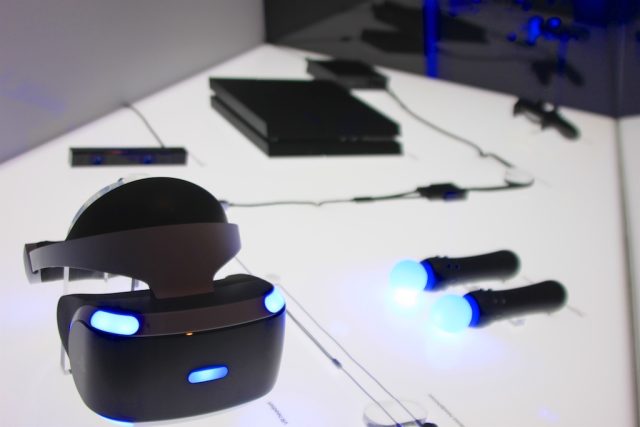
"We have to do this prior to launch, that's critical," Koller said. "We need to be in stores."
This kind of heavy marketing push sets PlayStation VR apart from PC-based competitors like the Oculus Rift and HTC Vive. Before their recent consumer launches, in-person demos for those headsets were largely limited to trade shows, fan conventions, and the odd touring demo truck (as well as very rough development kits, in Oculus' case).
After launch, getting a retail demo of those headsets hasn't been much easier. HTC recently announced a limited in-store Vive demo program at a few dozen retail locations across the United States, which will start ramping up to more locations by the end of the year. Oculus has discussed in-store demo stations for the Rift in the past but has yet to announce details of any such effort, forcing Rift owners to arrange their own unofficial demo programs (the mobile phone-based Samsung Gear VR is available to try in dozens of Best Buy locations).
By contrast, Koller leaned heavily on the importance of live, in-person, point-of-sale demos to selling the "emergent and ascendant technology" in the $399 PlayStation VR to consumers. When you try the headset, Koller said, it "really sells you on the experience, you're transported to places physically, actually emotionally feel like you're in another world."
In-store trials are especially important for skeptical consumers who have been sold a lot of "next big thing" technologies that have turned out to be fads, Koller said. While traditional TV and online advertising will be part of the PlayStation VR rollout, he said, only a live demo can leave those skeptical consumers with what he termed as the "PlayStation VR smile," convinced that they've seen the "holy grail" of VR technology.
"We need people to pick this up and play it. We need them to be transported," he said. "You have to be able to go into a GameStop and be able to try this. We have an ascendant technology, but you have to be able to get your hands on it, that's the thing... The ability to effect trials and get people to experience this is absolutely crucial. [Giving] trials is unequivocally the best thing we can do for the technology and the platform..."Having informed retail staff to guide players through the demos is also important, Koller said, to help players put on the headset for the first time and guide them through their first VR trip. "At point of sale, you have the right people there telling you what you need to know.... they're ready to help you," he said.
Koller said he envisions the kind of people who lined up outside stores for the launch of the PS4 also being ideal day one and year one purchasers of PlayStation VR. He talked up PlayStation VR's easy, plug-and-play setup, a planned launch lineup of 50 games in the first three months, and 200 developers already working on the platform as important differentiators for the platform.
Elsewhere in the investor presentation, GameStop COO Tony Bartel stressed the retailer's close relationship with Sony and said point-blank that "Sony will have the strongest launch titles and the largest install base [for virtual reality] at launch." As part of their PlayStation VR push, the stores will be offering 30 percent additional trade-in credit to consumers buying a PlayStation VR. Overall, Gamestop hopes it can capture up to 20 percent of the virtual reality hardware market in North America.
reader comments
46